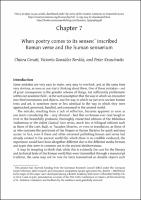When poetry comes to its senses
* inscribed Roman verse and the human sensorium : Chapter 7 of Dynamic Epigraphy: New Approaches to Inscriptions
Contributor(s)
Cousins, Eleri H. (editor)
Collection
Knowledge Unlatched (KU)Language
EnglishAbstract
Chapter 7 of Dynamic Epigraphy: New Approaches to Inscriptions
This volume, with origins in a panel at the 2018 Celtic Conference in Classics, presents creative new approaches to epigraphic material, in an attempt to 'shake up' how we deal with inscriptions. Broad themes include the embodied experience of epigraphy, the unique capacities of epigraphic language as a genre, the visuality of inscriptions and the interplay of inscriptions with literary texts. Although each chapter focuses on specific objects and epigraphic landscapes, ranging from Republican Rome to early modern Scotland, the emphasis here is on using these case studies not as an end in themselves, but as a means of exploring broader methodological and theoretical issues to do with how we use inscriptions as evidence, both for the Greco-Roman world and for other time periods. Drawing on conversations from fields such as archaeology and anthropology, philology, art history, linguistics and history, contributors also seek to push the boundaries of epigraphy as a discipline and to demonstrate the analytical fruits of interdisciplinary approaches to inscribed material. Methodologies such as phenomenology, translingualism, intertextuality and critical fabulation are deployed to offer new perspectives on the social functions of inscriptions as texts and objects and to open up new horizons for the use of inscriptions as evidence for past societies.
Keywords
Literary Criticism; Ancient & ClassicalISBN
9781789257915Publisher
Oxbow BooksPublisher website
https://www.oxbowbooks.com/oxbow/Publication date and place
2022Grantor
Imprint
Oxbow BooksClassification
Literary studies: ancient, classical and medieval


 Download
Download